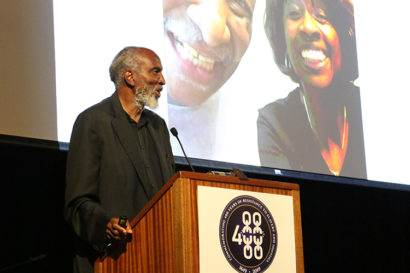Berkeley Talks: john powell on rejecting white supremacy, embracing belonging
The director of the Haas Institute spoke at an Aug. 30 symposium, the first event of a yearlong initiative commemorating the 400th anniversary of the forced arrival of enslaved Africans in the English colonies.

September 6, 2019

john powell speaks at an Aug. 30 symposium, part of the yearlong initiative, “400 Years of Resistance to Slavery and Oppression.” (UC Berkeley photo by Marcus Hanschen)
On Friday, Aug. 30, UC Berkeley held a symposium that marked the start of a yearlong initiative, “400 Years of Resistance to Slavery and Oppression,” commemorating the 400th anniversary of the forced arrival of enslaved Africans in the English colonies with a daylong symposium. It drew hundreds of attendees who heard from more than a dozen historians and social scientists about the impact and legacy of slavery in society today.

Read more stories about UC Berkeley’s observance of the 400th anniversary of the arrival of enslaved Africans to the English colonies.
In his keynote speech to close the symposium, john powell, director of the Haas Institute for a Fair and Inclusive Society and professor of law, African American studies and ethnic studies, discussed the link between slavery and white supremacy. Slavery, he said, created anti-black racism, which was necessary for the extraction of capital.
“It was never about, ‘I don’t like you because you’re different, because you have more melanin than me.’ It was about capital. It was about the U.S. industrializing … It was about the elites trying to figure out how to extract as much capital as possible and using people and people’s land to do that. Slavery is about America,” he said.